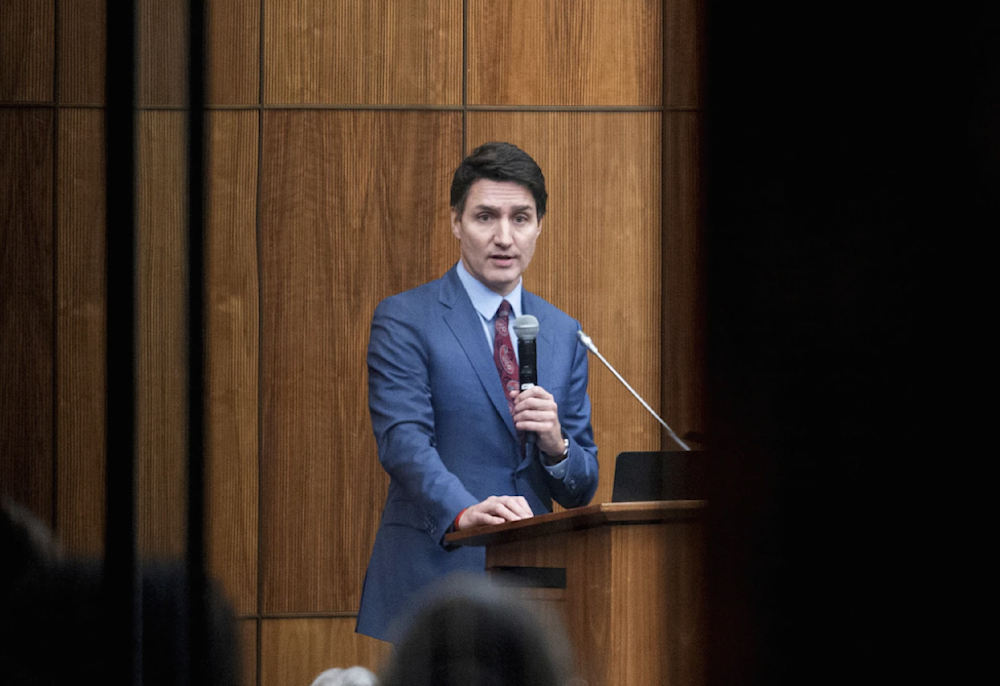Majority of Justin Trudeau’s caucus calls on him to quit
There is no procedure in the party to remove Trudeau, so he will have to make the decision to step down on his own if he does.
-

Canadian Prime Minister Justin Trudeau speaking with members of this caucus in Ottawa, Ontario on December 16, 2024. (AP)
With the majority of his caucus now asking him to resign, Canadian Prime Minister Justin Trudeau is on a ski vacation, debating whether to remain or leave.
Trudeau is polling low and facing internal party issues about whether he is the proper leader to bring Canadians together. His decision comes as Canada prepares for a trade battle when President Donald Trump returns to the White House in three weeks.
Canadians will vote in 2025, a federal election that might be called in late January if Trudeau's opponents destabilize the minority administration when the House returns from recess.
Calgary lawmaker George Chahal wrote in a December 27 letter to the caucus that Trudeau "no longer has the support of caucus and to maintain some dignity he should immediately tender his resignation."
Reports suggested Saturday that Trudeau might face another no-confidence vote as calls for his resignation keep mounting, particularly after Finance Minister Chrystia Freeland's resignation earlier this month.
Freeland’s resignation after nearly a decade as one of Trudeau's closest allies, has led the Prime Minister to consult intensively with advisors. While elections are scheduled for October 2025, many anticipate they could occur much sooner.
No-confidence vote in the works
The Parliament's Public Accounts Committee is set to hold a meeting on January 7 to consider a no-confidence motion against Trudeau’s government, according John Williamson, the panel's Conservative chair.
"It is now clear that the Liberal government does not have the confidence of parliament," Williamson announced on his X account.
Public Accounts will meet starting January 7 to address a motion of non-confidence in the Government.
— John Williamson (@JohnWilliamson_) December 27, 2024
The committee’s non-confidence report will be tabled in Parliament on Jan. 27 and could be voted on by Jan. 30.
The Government no longer commands the confidence of Parliament. pic.twitter.com/KPK4p9l9AQ
He has also been abandoned by his Atlantic caucus, which Trudeau's aides saw as critical to the party's chances of winning a fourth term.
The Atlantic Liberals now believe it is in the PM's best interest to quit, feeling he cannot defeat Pierre Poilievre, a populist conservative promising change. They also warn that if Trump follows through on his pledge to impose a 25% tax on all Canadian exports on day one, the country might be thrown into chaos.
"Time is of the essence, and our Caucus is of the view that it is not tenable for you to remain as Leader, and that we need to allow for the necessary transition conversations to take place," Atlantic Caucus head Kody Blois wrote to the prime minister on December 23.
An anonymous senior Liberal source said the letters will not impede Trudeau's contemplation. The prime minister is on a ski holiday with his family in British Columbia and is slated to be away from the office until January 6.
Liberal caucus members want a response when Trudeau returns to Ottawa.
There is no procedure in the party to remove Trudeau, so he will have to decide on his own. If he decides to stand down, the Liberal Party constitution specifies that the board would appoint an interim leader.
"His thinking right now is less about his political legacy," the senior Liberal source said, and more about "leaving the party in the best shape as possible" and putting a strategy in place.
Trudeau continues to lead in fundraising among Liberal MPs, which may be influencing his indecision on stepping down, as no clear successor has emerged. Some speculate that Finance Minister Chrystia Freeland may be positioning herself as a potential leader, with one Liberal MP praising her "exceptional political acumen" and suggesting she has become a credible alternative to Trudeau's leadership amid his declining approval ratings.

 4 Min Read
4 Min Read








